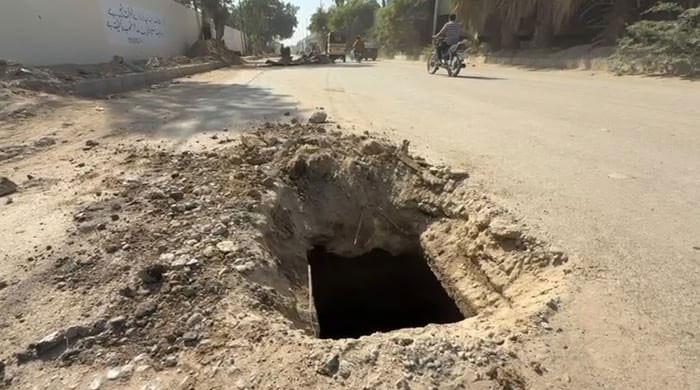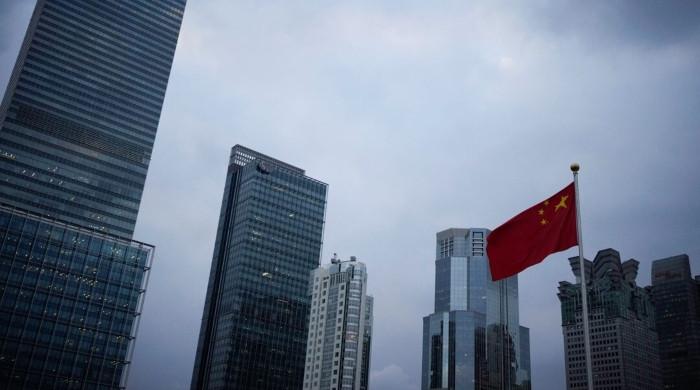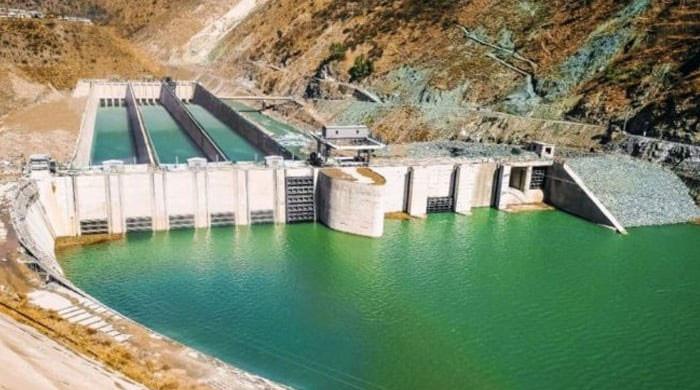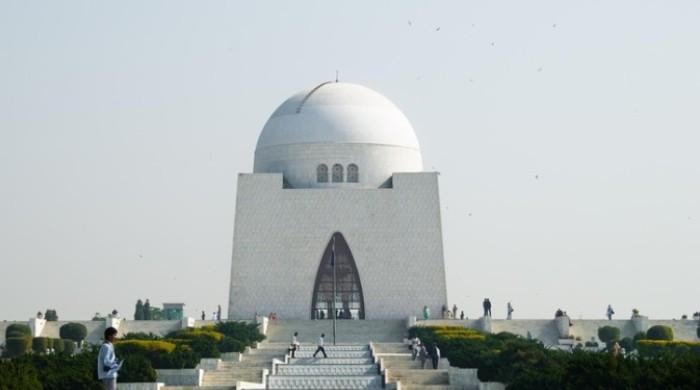The making of Rao Anwar
The story of Rao Anwar and well known 'killer cops' is actually the story of how the State operates contradictory to legal and judicial course
January 22, 2019
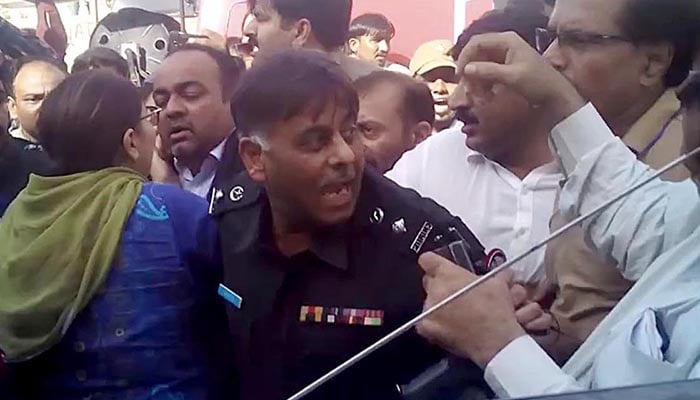
Why is that each time a 'fake encounter' takes place it reminds everyone of one police officer i.e. Rao Anwar, a former SSP, who retired last month after completing his service for over three decades? His career which revolved around scores of controversies and controversial encounters.
For those who backed him, supported him, he was an 'encounter specialist,' who killed many militants. For those who opposed him and hate him, he was a disgrace to the profession and believed he would enter history as the 'killer' of many innocents.
But, the man himself said, what he did was part of the State policy for which he was also rewarded both, in 'cash and kind.' The police officer received millions as reward money and lucrative postings of his choice. This is the career of Rao Anwar.
When the State failed in building institutions, professional police force, effective judicial system and prisons, it produced the likes of Rao Anwar, as it suits the system. Former Chief Justice of the Sindh High Court, Justice (retd) Nasir Aslam Zahid once said while hearing a case of 'fake encounter,' that some police officers in Sindh have become so powerful that no could even suspend or transfer them.

Rao has now retired but the system is set up to produce yet another like him. He survived all attempts to dislodge him before he was finally caught in Naqeebullah Mehsud’s murder. He never expected the kind of resistance which came from the family and the tribe and put him in a difficult position. His 'masters' could not do much except ensuring that he would not remain in prison. Let see what ultimately happens to the case.
So, his final exit came in disgrace and he has now become a 'symbol' of fake encounters.
"What I did over the years was what I have been told to do and gave the results, whether it is MQM militants or Taliban,' he once told me.
A senior police officer under whom Rao had worked when asked about him told me, “he was a good cop with a good intelligence network before he got too close to the political elite and certain quarters and started considering himself about the law.”
“They used him and he used them,” he added.
What Rao and a special team of 'killer cops' did over the years was State policy, which produced the likes of Rao Anwar, Ch. Aslam, Irfan Bahadur, Taufiq Zahid and others, some of whom were later killed allegedly by the militants of MQM, Lyari gangs and Al-Zulfiqar.
So, how did a simple police officer in the 80s suddenly become 'terror' and the 'blue-eyed' boy of relevant quarters and political elite which recently gave him the title of ‘badhur bacha.'
I first met Rao, in the 80s, when he was posted as SHO Gulshan-e-Iqbal. At that time I was working for an evening newspaper, 'The Star,' and looking for some juicy stories in accordance with the demand of the paper. He gave me the story regarding a noted 'drug baron,' operating from Sohrab Goth and disclosed that the said place had been used as a dumping ground for drugs and arms.
Those were the days when stories regarding drug barons hit the headlines. I did one on a famous don of those days known as 'Black Prince.'
All those storied in the print media led to the operation in Sohrab Goth in 1986, when Syed Ghous Ali Shah was the Chief Minister. In retaliation, the powerful lobby which backed the drug smugglers created law and order and ethnic strife in Karachi.
Rao later got different postings but not a lucrative one which he got after the two Karachi operations, one in 1992 and the other in 1994, for his pro-active role. He also realized that it’s important to get close to politicians particularly those in the ruling elite and for the first time he got close to PPP leadership through late Munawar Surwardi, a close associate of former Prime Minister Benazir Bhutto and former Federal Minister late Amir Haider Kazmi, while he was posted at Thamoria Police Station.
Later, he also got close to former President, Asif Ali Zardari and his close aides.
He became an 'important source' for journalists particularly at a time when late Jam Sadiq Ali become the Chief Minister, and the famous Veena Hayat case hit the headline followed by reports how CIA under DIG CIA, Samiullah Marwat and adviser on Interior, Irfanullah Marwat launched anti PPP operation and was also involved in alleged illegal activities. Later, former Prime Minister Nawaz Sharif constituted a high powered commission headed by Lt. General (retired) Shafiqur Rehman.
While in the 80s, Rao was not among high profile police officers like late Altaf Ali Khan, Waseem Ahmad, late Mumtaz Burney, late Khawaja Nisar or Akhtar Siddiqui, but, in post-90s, his name became part of every second crime story.
When the decision was taken regarding an army led operation in Sindh in May 1992, about a dozen police officers were picked because intelligence agencies believed they had a good know-how about the alleged militant wing of MQM. Similarly, in rural Sindh an operation was launched against dacoit and '72 Big Fish,' but, it was dumped after nine innocent villagers were killed in a 'fake encounter,' and portrayed as dacoits and terrorists. Like any such encounters weapons were also recovered and even the then Army Chief late General Asif Nawaz and former Prime Minister Nawaz Sharif visited village Tando Bahawal. When media exposed the encounter Gen. Nawaz got so furious that he ordered the arrest of the party including Maj. Arshad, who was Court Marshal and hanged to death.
The operation turned to Karachi on June 19, 1992, and although it was an intelligence-based operation comprising ISI and MI, a special police team provided the major lead. Earlier, on the request of Sindh government, Rangers were posted in Karachi in 1989, but, did not enjoy the kind of power they have now.
The operation was halted when the then Prime Minister's brother, Mir Murtaza Bhutto was killed in an encounter outside Bhutto's historic house, 70 Clifton on September, 20th, 1996.
Most of these police officers played a key role in the operation against MQM, and also got massive 'cash rewards.' It became the State policy to crush militancy through such encounters and in the process many alleged MQM militants were killed but in the so-called 'collateral damage' theory many MQM workers also became the target.
In the post 9/11 scenario, Rao realized that the State has decided to target al-Qaeda, Taliban and sectarian outfits. So, he led many operations in the outskirts of Karachi and claimed of killing many Taliban, Lashkar-e-Jhangvi and other alleged militants of outlawed groups.
Rao Anwar was among those police officers who got massive reward money along with Ch. Aslam and few others. Rao, once confessed in a private conversation that during the course of operations, many police officers also killed those MQM workers who were not involved in any criminal activities. He said these workers were made out to be criminals and killed in a bid to get reward money.
In the last operation, which was launched in 2013, Rao once again targeted MQM but unlike in the past did not have much political backing as in two incidents he faced embarrassment. One, when he claimed he had unearthed a RAW plan to destabilize Karachi and arrested three MQM, London militants. Later, the court rejected these charges and acquitted all. He also faced reaction from his own police boss when he arrested leader of the opposition in Sindh Assembly MQM's Khawaja Izhar ul Hasan.
Over the years these cops become so powerful and enjoyed so much support from authorities that at one stage even the former Chief Justice of Sindh High Court, Justice (retd) Nasir Aslam Zahid ruled that such officers should not be posted in Karachi. He had issued many orders regarding people being killed in 'extrajudicial,' manner, but, the selected team of cops including Rao, simply remained 'untouchable.'
Many police officers who played leading a role in Karachi operations in the past were later killed. Official reports blamed MQM militants for the killing of these officers and their numbers were around 100. However, in some cases, the officials also blamed Al-Zulfiqar, Lyari gang and Taliban as well.
Rao Anwar also played a role during the recent operations launched in 2013, but, for the first time police took the back seat and Rangers were given additional power and they took the lead.
However, Rao continued getting support from these quarters and claimed killing many militants of outlawed sectarian outfits and Taliban as well as MQM London militants. But, for the first time, he faced opposition from within police as well as from the court.
So, the story of Rao Anwar and well known 'killer cops' is actually the story of how the State operates contradictory to the legal and judicial course.
Rao has now retired but, if the State continues to support and back 'extrajudicial killings' or fake encounters, we may continue to produce officers like Rao Anwar.
.
.
Abbas is a senior columnist and analyst of GEO, The News and Jang. He tweets @MazharAbbasGEO
Note: The views expressed are those of the author, and do not necessarily reflect the official policy or position of Geo News or the Jang Group.





